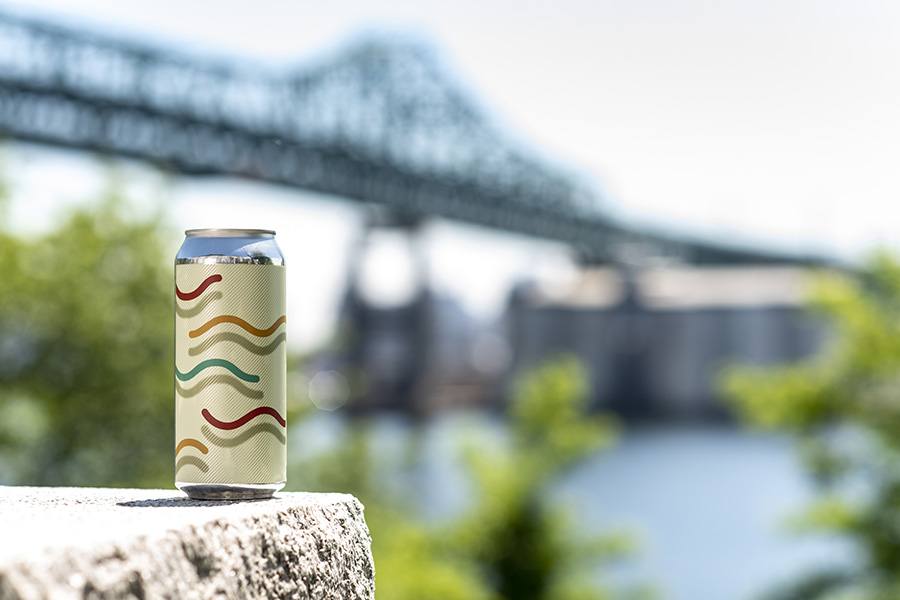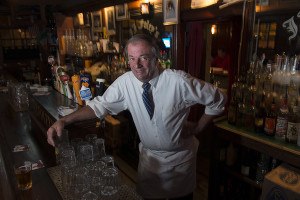Here’s Why Boston’s Truly Original Mystic Brewery Is Calling It Quits
The Chelsea beer company cannot continue to operate as-is, but the future is uncertain.

A can of Mystic Table Beer is a true Boston innovation. Pour one out. / Photo by Joe Makarski / @makphoto_van_travels
The Boston beer scene will soon be a little less effervescent, Chelsea will lose its only brewery, and the Orange Dino IPA will really be extinct. Mystic Brewery, a recent Best of Boston winner and one of the region’s first microbrew players when it launched in Chelsea in 2011, is shutting down operations.
The surprising news was announced last Friday, Sept. 27, with a social media post signed by founder Bryan Greenhagen. Along with expressions of sorrow and gratitude, Greenhagen told fans that over the next few weeks, Mystic “will be celebrating what our brewery has accomplished by releasing some final batches, special beers, and selling off our beer archive as well as selling off all of our barrels to the public.”
Saturday, Oct. 19, will be the taproom’s final day in business, and Ciao Pizza will be on hand to soften the blow with free pies. Since the initial announcement, “There has been a ton of attention resulting in interest in rescuing Mystic,” Greenhagen says. “While our social media channels may go dark after this weekend, we will be sure to make an announcement if we have anything to share in terms of developments.”
It remains to be seen what the future could hold, but in the meantime, there are very real reasons that led Greenhagen to make this decision. In a BeerAdvocate forum post on September 28, he elaborated. It’s a “very complex constellation” of reasons, he tells Boston. The limits of Mystic’s current location, as well as a very expensive attempt to move into a new space, were certainly chief among them.
“It’s not that people don’t want [our] high quality beer, it’s that people can’t get it,” he says.
Mystic has been brewing at capacity for years now, able to make just 3,000 barrels of beer per year out of its unique Chelsea facility. Greenhagen uses a customized set of squat, square fermentors, rather than common stainless-steel cylinders, to achieve the distinctive soft, fragrant, and aromatic flavors of his saisons and ales. In 2018, he announced plans to expand into a new space in Malden, but the move never panned out because of construction hurdles. That diversion is a major contributing factor of the brand’s demise, as Mystic sank “a substantial amount” of money into renovating the space before realizing it wasn’t going to be possible, Greenhagen says. He hasn’t been able to grow Mystic’s retail presence, because he physically can’t make enough beer.
“If you’re expanding through wholesale, you have to sell a ton of beer to be profitable, but we’re not set up to be a big brewery,” Greenhagen explains.
That’s why so many breweries rely on their taprooms to bring in revenue. Mystic’s opened in 2013, a couple years after the brewery launched and set out to do things differently for even an early-era craft beer company. At the outset, Greenhagen—a fermentation and flavor scientist with a PhD in plant biochemistry—began creating Old World-style beers in the Belgian Geuzestekerij style, a production method in which unfermented beer is brewed at other facilities, then fermented and aged on-site. In 2015, Mystic got its own brewhouse and established a dedicated wild-aging facility, thanks in part to a handshake deal with Cambridge Brewing Company brewmaster Will Meyers that gave Mystic a 20-barrel brewing system once owned by Vermont’s Hill Farmstead Brewery.
Meanwhile, the taproom has been a great success, but recently, the crowds have subsided, Greenhagen says. That’s partially because Mystic has never been able to host food trucks, a lack of amenities which discourages some visitors. It’s also due in part to the fact that there are more breweries than ever competing for people’s beer money. But it’s also because of perceived difficulty in getting to the Chelsea taproom, Greenhagen says, stemming from traffic concerns related to the new Encore Boston Harbor Casino, as well as current lane shutdowns due to Tobin Bridge construction.
“It’s awesome, but it’s a challenge to operate in this facility,” Greenhagen says. “We started in a different way; we didn’t expect to have a taproom. We had no ambition to be huge. We were just trying to make it work as a small and specialty brewery. We were writing one plan after another to try to keep going, but we can’t find a combination that works.”
A couple years ago, Mystic began canning its standout Table Beer, a feat of innovation because the low-alcohol, full-flavored saison requires secondary fermentation in its packaging. That’s something no brewery had ever tried in the aluminum format. Following the success of Table Beer, Mystic launched many, many more cans—and soon began filling them with more and more IPAs. The hop-forward style of beer that undeniably leads American craft beer sales was never Mystic’s focus, but Greenhagen’s team proved adept at the hazy, New England-born style. Well-balanced juice bombs, like Voltage and Orange Dino, helped earn the Chelsea outfit the Best of Boston award for best brewery in 2018. Some critics have suggested pivoting to IPAs did Mystic in, but Greenhagen disagrees.
Also in 2018, Greenhagen launched a Mystic side project called Von Lune Lagers. That brand could live on as a contract-brewed product, the brewmaster says. The Chelsea brewery itself, which was also used by Cambridge Brewing Company, could also continue under new ownership, Greenhagen says, but CBC is already out.
“We [had] been brewing CBC beer there for more than four years while sharing a portion of their brewery space. We are fortunate and grateful to have had the opportunity to create and release many exceptional and award-winning beers in that time,” says CBC’s Meyers. “Despite the inevitable challenges inherent in two organizations sharing the same space for several years we believe our collaborative endeavor was a creative success and we are proud of the work we have done. We are truly very sorry for the circumstances surrounding the closure of our friends’ brewery, and we are exploring other opportunities and look forward to sharing more innovative and delicious CBC offerings in the future.”
Craft beer fans in Boston were lucky to have Greenhagen’s unique perspective as part of our burgeoning scene. And that might continue, as well: The brewmaster says he is interested in brewing education. “I’m trying to find some opportunities to get involved with formal training at a university or brewing school,” he says.
The future is uncertain, but when he looks back on Mystic’s eight-year run, he’s proud of the legacy.
“Our mission was to improve the beer culture in Boston and beyond. When we first started, high-end restaurants wouldn’t even buy beer,” Greenhagen recalls. “We think it’s been a success.”
Keep in touch with Mystic Brewery on social media to catch its final releases, and to see what the future holds.
174 Williams St., Chelsea, 617-466-2079, mystic-brewery.com.
This post was updated October 16 with news about the final day for Mystic Brewery’s Chelsea taproom.


